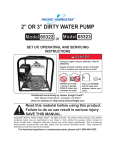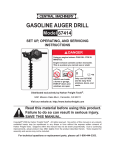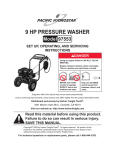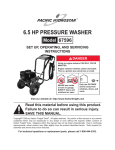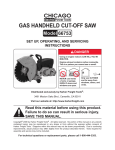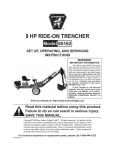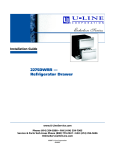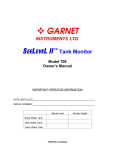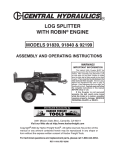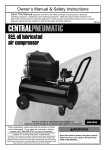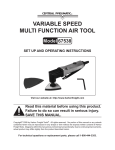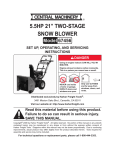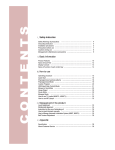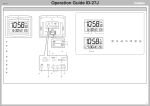Download Harbor Freight Tools 65761 User's Manual
Transcript
Log splitter 65761 Set up, Operating, and Servicing Instructions Using an engine indoors CAN KILL YOU IN MINUTES. Engine exhaust contains carbon monoxide. This is a poison you cannot see or smell. NEVER use inside a home or garage, EVEN IF doors and windows are open. Only use OUTSIDE and far away from windows, doors, and vents. Distributed exclusively by Harbor Freight Tools®. 3491 Mission Oaks Blvd., Camarillo, CA 93011 Visit our website at: http://www.harborfreight.com Read this material before using this product. Failure to do so can result in serious injury. Save this manual. Copyright© 2008 by Harbor Freight Tools®. All rights reserved. No portion of this manual or any artwork contained herein may be reproduced in any shape or form without the express written consent of Harbor Freight Tools. Diagrams within this manual may not be drawn proportionally. Due to continuing improvements, actual product may differ slightly from the product described herein. Tools required for assembly and service may not be included. For technical questions or replacement parts, please call 1-800-444-3353. Contents Important SAFETY Information���������������������������� 3 Basic Specifications������������� 7 Unpacking���������������������������������� 7 Set Up Instructions��������������� 7 Assembly���������������������������������������� 7 Packing the bearings.��������� 8 Hub and Wheel Assembly���� 8 Connecting the Rail Assembly to the Oil Tank� 8 Operating Instructions���� 10 Engine Controls����������������������� 10 Starting the Engine����������������� 10 Checking and Filling Engine Oil����������������������������� 10 Checking and Filling Fuel10 Checking and Filling Hydraulic Fluid����������������� 10 Start Procedure����������������� 11 Break-in Period�������������������� 11 Equipment Operation��������������� 12 Transporting the Log Splitter��������������������������������� 12 Technical Specifications�� 14 Servicing���������������������������������� 14 Maintenance Procedures����� 14 Engine Oil Change��������������� 14 Air Filter Element Maintenance����������������������� 15 Spark Plug Maintenance�� 15 Fuel Filter Replacement (if equipped)������������������������� 15 Cleaning, Maintenance, and Lubrication Schedule���������� 16 SKU 65761 After Initial 20 Operation Hour Period:� 16 Every 25 Operation Hours Thereafter:����������� 16 Every 50 Operation Hours:������������������������������������ 16 Every 100 Operation Hours:������������������������������������ 16 Every 300 Operation Hours:������������������������������������ 16 Storage����������������������������������������16 Transport Maintenance�������� 17 Troubleshooting���������������������� 18 ASSEMBLY DIAGRAM���������������� 21 Cylinder head parts list & diagram������������������������������ 22 Crank case parts list & diagram���������������������������������� 23 Crank case cover parts list and diagram����������������� 24 CRANKSHAFT/PISTON PARTS LIST & DIAGRAM���������������������� 25 Gas distribution adjustment system parts list & diagram��������� 26 Starter subassembly parts list & diagram��������� 26 Starter subassembly parts list & diagram��������� 27 Diversion Assembly parts list & diagram���������������������� 28 Carburetor parts list & diagram���������������������������������� 29 For technical questions, please call 1-800-444-3353. Page 2 Flywheel/coil assembly parts list & diagram��������� 30 Control system parts list & diagram���������������������� 31 Air cleaner parts list & diagram���������������������������������� 32 Muffler parts list & diagram���������������������������������� 33 Muffler parts list & diagram���������������������������������� 34 Limited 1 year / 90 Day warranty������������������������������ 35 Emission Control System Warranty������������������������������ 35 SKU 65761 For technical questions, please call 1-800-444-3353. Page 3 Save This Manual NOTICE is used to address practices not related to personal injury. Keep this manual for the safety warnings and precautions, assembly, operating, inspection, maintenance and cleaning procedures. Write the product’s serial number in the back of the manual near the assembly diagram (or month and year of purchase if product has no number). Keep this manual and the receipt in a safe and dry place for future reference. CAUTION, without the safety alert symbol, is used to address practices not related to personal injury. WARNING! Read all instructions. Failure to follow all instructions listed below may result in fire, serious injury and/or DEATH. The warnings and precautions discussed in this manual cannot cover all possible conditions and situations that may occur. It must be understood by the operator that common sense and caution are factors which cannot be built into this product, but must be supplied by the operator. Important SAFETY Information In this manual, on the labeling, and all other information provided with this product: This is the safety alert symbol. It is used to alert you to potential personal injury hazards. Obey all safety messages that follow this symbol to avoid possible injury or death. DANGER indicates a hazardous situation which, if not avoided, will result in death or serious injury. WARNING indicates a hazardous situation which, if not avoided, could result in death or serious injury. CAUTION, used with the safety alert symbol, indicates a hazardous situation which, if not avoided, could result in minor or moderate injury. SKU 65761 SAVE THESE INSTRUCTIONS Set up precautions 1. Gasoline fuel and fumes are flammable, and potentially explosive. Use proper fuel storage and handling procedures. Do not store fuel or other flammable materials nearby. 2. Have multiple ABC class fire extinguishers nearby. 3. Operation of this equipment may create sparks that can start fires around dry vegetation. A spark arrestor may be required. The operator should contact local fire agencies for laws or regulations relating to fire prevention requirements. 4. Set up and use only on a flat, level, well-ventilated surface. For technical questions, please call 1-800-444-3353. Page 4 5. 6. Wear ANSI-approved safety goggles, heavy-duty work gloves, and dust mask/respirator during set up. Use only oil and fuel recommended in the “Specifications” section of this manual. not D.O.T. compliant, and is not road legal. 5. Always make sure the hitch coupler is securely fixed to the vehicle before moving it. If the Coupler is not secured properly, the link could come loose while the trailer is in motion, possibly causing property damage, SERIOUS PERSONAL INJURY, or DEATH. 6. Never split a log that contains any foreign materials (nails, for example). 7. Never place your hands or body near a hydraulic fluid leak. High-pressure fluid can be forced under the skin resulting in serious injury. 8. Do not use on logs longer than 25” or with a diameter greater than 8”. 9. Do not leave the equipment unattended when it is running. Turn off the equipment (and remove safety keys, if available) before leaving the work area. Operating precautions 1. Carbon Monoxide Hazard Using an engine indoors CAN KILL YOU IN MINUTES. Engine exhaust contains carbon monoxide. This is a poison you cannot see or smell. NEVER use inside a home or garage, EVEN IF doors and windows are open. Only use OUTSIDE and far away from windows, doors, and vents. 2. Keep children away from the equipment, especially while it is operating. 3. Operate the Log Splitter, with the wheels blocked, on a dry, level surface capable of supporting the combined weight of the Log Splitter and logs. 4. Do not drive the Log Splitter on roads or highways. This product is SKU 65761 10. Wear ANSI-approved safety goggles, heavy-duty work gloves, steel-toe work boots and hearing protection during use. 11. People with pacemakers should consult their physician(s) before use. Electromagnetic fields in close proximity to a heart pacemaker could cause pacemaker interference or pacemaker failure. Caution is necessary when near the engine’s magneto or recoil starter. 12. Use only accessories that are recommended by Harbor Freight Tools for your model. Accessories that may be suitable for one piece of equipment For technical questions, please call 1-800-444-3353. Page 5 may become hazardous when used on another piece of equipment. 13. Do not operate in explosive atmospheres, such as in the presence of flammable liquids, gases, or dust. Gasoline-powered engines may ignite the dust or fumes. 14. Stay alert, watch what you are doing and use common sense when operating this piece of equipment. Do not use this piece of equipment while tired or under the influence of drugs, alcohol or medication. 15. Do not overreach. Do not reach over or across the Log Splitter. Keep proper footing and balance at all times. This enables better control of the equipment in unexpected situations. 16. Dress properly. Do not wear loose clothing or jewelry. Keep hair, clothing and gloves away from moving parts. Loose clothes, jewelry or long hair can be caught in moving parts. 17. Parts, especially exhaust system components, get very hot during use. Stay clear of hot parts. 18. Do not cover the engine or equipment during operation. 19. Keep the equipment, engine, and surrounding area clean at all times. 21. Do not operate the equipment with known leaks in the engine’s fuel system. 22. This product contains or, when used, produces a chemical known to the State of California to cause cancer and birth defects or other reproductive harm. (California Health & Safety Code § 25249.5, et seq.) 23. When spills of fuel or oil occur, they must be cleaned up immediately. Dispose of fluids and cleaning materials as per any local, state, or federal codes and regulations. Store oil rags in a bottom-ventilated, covered, metal container. 24. Keep hands and feet away from moving parts. Do not reach over or across equipment while operating. 25. Before use, check for misalignment or binding of moving parts, breakage of parts, and any other condition that may affect the equipment’s operation. If damaged, have the equipment serviced before using. Many accidents are caused by poorly maintained equipment. 26. Use the correct equipment for the application. Do not modify the equipment and do not use the equipment for a purpose for which it is not intended. 20. Use the equipment, accessories, etc., in accordance with these instructions and in the manner intended for the particular type of equipment, taking into account the working conditions and the work to be performed. Use of the equipment for operations different from those intended could result in a hazardous situation. SKU 65761 For technical questions, please call 1-800-444-3353. Page 6 1. Service precautions 7. Before service, maintenance, or cleaning: Store equipment out of the reach of children. 8. Follow scheduled engine and equipment maintenance. 9. Refueling Precautions: a.Turn the engine switch to its “OFF” position. b.Allow the engine to completely cool. c. Then, remove the spark plug wire(s) from the spark plug(s). 2. Keep all safety guards in place and in proper working order. Safety guards include muffler, air cleaner, mechanical guards, and heat shields, among other guards. 3. Do not alter or adjust any part of the equipment or its engine that is sealed by the manufacturer or distributor. Only a qualified service technician may adjust parts that may increase or decrease governed engine speed. 4. Wear ANSI-approved safety goggles, heavy-duty work gloves, and dust mask/respirator during service. 5. Maintain labels and nameplates on the equipment. These carry important information. If unreadable or missing, contact Harbor Freight Tools for a replacement. 6. Have the equipment serviced by a qualified repair person using only identical replacement parts. This will ensure that the safety of the equipment is maintained. Do not attempt any service or maintenance procedures not explained in this manual or any procedures that you are uncertain about your ability to perform safely or correctly. SKU 65761 a.Do not smoke, or allow sparks, flames, or other sources of ignition around the equipment, especially when refuelling. b.Do not refill the fuel tank while the engine is running or hot. c. Do not fill fuel tank to the top. Leave a little room for the fuel to expand as needed. d.Refuel in a well-ventilated area only. Save these instructions. For technical questions, please call 1-800-444-3353. Page 7 section at the beginning of this manual including all text under subheadings therein before set up or use of this product. Basic Specifications Fuel Engine Oil Hydraulic Fluid Type 89+ octane unleaded gasoline Capacity 1.2 Gallons Type 10W30 (above 32° F) 5W30 (at 32° F or below) Capacity 1.1 Quarts Capacity 2.5 Gallons Log Capacity 25” L x 8” Diameter Tire Pressure 60 PSI Cold Pressure To prevent serious injury from accidental starting: Turn the Power Switch of the equipment to its “OFF” position, wait for the engine to cool, and disconnect the spark plug wire(s) before assembling or making any adjustments to the equipment. Note: Additional specifications found in the Technical Engine Specifications chart in this manual. To prevent serious injury: Operate only with proper spark arrestor installed. The emission control system for this engine is warranted for standards set by the U.S. Environmental Protection Agency and by the California Air Resources Board (also known as CARB). For warranty information, refer to the last pages of this manual. At high altitudes, the engine’s carburetor, governor (if so equipped), and any other parts that control the fuel-air ratio will need to be adjusted by a qualified mechanic to allow efficient high-altitude use and to prevent damage to the engine and any other devices used with this product. Unpacking When unpacking, make sure that the item is intact and undamaged. If any parts are missing or broken, please call Harbor Freight Tools at the number shown on the cover of this manual as soon as possible. Set Up Instructions Read the entire Important Safety Information SKU 65761 Operation of this equipment may create sparks that can start fires around dry vegetation. A spark arrestor may be required. The operator should contact local fire agencies for laws or regulations relating to fire prevention requirements. Note: For additional information regarding the parts listed in the following pages, refer to the Assembly Diagram near the end of this manual. Assembly 1. Due to the size and weight of the Log Splitter, assembly should be performed with assistance. 2. Access the Tires (48) for the following maintenance and assembly steps. For technical questions, please call 1-800-444-3353. Page 8 Packing the bearings. 3. Using a suitable solvent, clean the bearings and the rest of the parts in the Hub assembly. The parts must be cleaned even if they are new or appear clean. 4. Allow all pieces to dry completely. 5. Place fresh, clean bearing grease in the packer. 6. With the grease-filled bearing packer in one hand and the bearing in the other, press the bearing into the grease, forcing the grease inside the slots in the bearing, continue doing this until every slot in the bearing is completely full of grease. Hub and Wheel Assembly 7. Put a Seal (59) and Bearing (49) on the Axle and then put the Tire (48) on the Axle. 8. With each Tire in place, add a Washer (50) and a Spindle Nut (51) onto the ends of the Axles. Tighten the Spindle Nuts to 20-25 ft. pounds and turn each tire several times to seat the bearing. Back off the Spindle Nut one half turn. Insert a Cotter Pin (25) through both the Axle and the Spindle Nut (51) and bend the end of the Pin back to hold it in place. Last, tap on a Wheel Cap (61). Head Nut (17) and a Hex Head Bolt (16). Note: When travelling, remove the Push Pin (26) and Hair Pin Clip (29) and lift the Front Leg Assembly up so that it is parallel to the Rail Assembly. Replace the Push Pin (26) and Hair Pin Clip (29) into the Horizontal Transport Hole shown just above the Oil Plug. 10. To connect the Rail Assembly (2) to the Oil Tank Assembly, insert a Hex Head Bolt (16) into the middle hole of the “L” shaped bracket on the Oil Tank Assembly. Secure it with a Hex Head Nut (17). 11. In FIGURES 1 and 2 (see next page), the Rail Assembly (2) is shown in Horizontal mode for operation and travel (as mentioned above, the Front Leg Assembly (11) must be secured up in the horizontal position when travelling). Connecting the Rail Assembly to the Oil Tank 9. Insert the Front Leg Assembly (11) into the bracket on the Oil Tank Assembly (10B). Insert the remaining Hex Head Bolt (16) through the hole in the middle of the bracket of the Oil Tank Assembly. Secure it with a Hex SKU 65761 For technical questions, please call 1-800-444-3353. Page 9 FIGURE 1 Slide Assembly (3) Safety Chain with Hook (4) Base Cylinder (1) Place Log Here Hitch Coupler (9) Hex Head Nut (17) is attached to Hex Head Bolt (16) Horizontal transport hole Push Pin (26) and Hair Pin Clip (29) Push Pin (26) Oil Plug (37) with air inlet hole Front Leg Assembly (11) Rail Assembly (2) Vertical Position Hole Hex Head Nut (17) is attached to Hex Head Bolt (16) Vertical position locking hole Oil Drain Plug Hydraulic Oil Tank (10B) Wheel Cap (61) FIGURE 3 FIGURE 2 Horizontal transport hole Second Push Pin (26) secures Rail Assembly (2), and is removed for vertical log splitting. Air Inlet Hole Push Pin (26) Close-up of Push Pin (26) securing the Front Leg Assembly (11) to the bracket on the Oil Tank Assembly (10B). SKU 65761 Hydraulic Oil Fill Plug (37) with air inlet hole For technical questions, please call 1-800-444-3353. Page 10 Operating Instructions Read the entire Important Safety Information section at the beginning of this manual including all text under subheadings therein before set up or use of this product. This product requires engine oil, hydraulic fluid, and fuel to be added before starting. Attempting to start the engine without oil will ruin the engine and void the warranty. Starting the Engine Inspect engine and equipment looking for damaged, loose, and missing parts before set up and starting. If any problems are found, do not use equipment until fixed properly. CAUTION! Do not run the engine with too little or too much oil. The engine will be permanently damaged. Checking and Filling Fuel WARNING! To prevent serious injury from fire: Fill the fuel tank in a well-ventilated area away from ignition sources. Do not smoke. 4. To fill the Fuel Tank, first wipe off the Fuel Tank Cap and the surrounding area. 5. Unscrew, and remove the Fuel Tank Cap. 6. Mix fuel stabilizer (not included) with 89 octane (or better) unleaded gasoline according to fuel stabilizer directions. 7. Fill the Fuel Tank to about 1 inch under the fill neck of the gasoline tank. 8. Then replace the Fuel Tank Cap. Checking and Filling Engine Oil CAUTION! Your Warranty is VOID if the engine’s crankcase is not properly filled with oil before each use. Before each use, check the oil level. Do not run the engine with low or no engine oil. Running the engine with no or low engine oil WILL permanently damage the engine. 1. Wipe the area around the cap with a clean rag before removing it. 2. If the oil level is below the bottom of the Oil Cap add the appropriate type of oil until the oil level is full. Oil type: 32° F or above = SAE 10W30 Below 32° F = SAE 5W-30 3. Replace the Oil Fill Cap. SKU 65761 Checking and Filling Hydraulic Fluid 9. Remove the Plug (37) and fill the tank with Hydraulic fluid (not included). To check the fluid level remove the Dipstick (62), check the level then replace it. The fluid should be at the upper notch of the Dipstick. Be sure that a constant oil level of 2.5 gallons is maintained. 10. The hydraulic system must be vented during operation or it may become vacuum locked and stop working. To vent the syste, back off oil fill plug one turn (maximum). See Figure 3. When the Log Splitter is not in operation or being transported, close the For technical questions, please call 1-800-444-3353. Page 11 air inlet hole by tightening the Plug, as shown below. Plug (37) slowly. Repeat as necessary, until the engine starts. 5. After the engine starts and warms up, slowly move the choke lever to its “RUN” position. 6. IMPORTANT: Allow the engine to run at no load until warm (1-5 minutes). Break-in Period Air Inlet Hole 1. Breaking-in the engine will help to ensure proper equipment and engine operation, and will extend the engine’s lifespan. The warranty is void if the engine is not broken in properly. The first 20 hours of operation is the break-in period. 2. During the first 3 hours of use: O Ring (21) Start Procedure Before starting the engine: a.Follow the Set Up Instructions to prepare the equipment. b.Inspect the equipment and engine. c. Fill the engine with the proper amount and type of fuel and oil. d.Read the Equipment Operation section that follows. 1. Turn the engine fuel valve to its “OPEN” position. 2. Turn the engine power switch to its ON or RUN position. 3. Then, turn the engine choke lever to its “CHOKE” position. Set the choke lever in the “RUN” position when starting a warm engine. 4. Grasp the starter handle, and pull slowly until resistance is felt. While holding the handle, allow the starter rope to rewind slowly. Then, pull the starter handle with a rapid, full arm stroke. Once again while holding the handle, allow the rope to rewind SKU 65761 • Do not apply a heavy load to the equipment. • Do not operate the engine at its maximum speed. 3. After the first 20 hours of use: • Change the engine oil. Under normal operating conditions subsequent maintenance follows the schedule explained in the Maintenance and Servicing section. Equipment Operation 1. WARNING! To avoid death or serious injury; block each side of both wheels of the Log Splitter before starting a job. 2. In FIGURE 1, the Rail Assembly is shown in Horizontal mode for operation and travel. In FIGURE 4 the unit is shown in the vertical position. To change positions, remove the Hair Pin Clip (29) and the Push Pin (26). For technical questions, please call 1-800-444-3353. Page 12 A close-up of this Push Pin (26) is shown in FIGURE 3 on page 5. Tilt the unit to the vertical position as shown in FIGURE 4, and replace both the Push Pin (26) and the Hair Pin Clip (29) into the vertical position hole (See FIGURE 1). Reverse the process to return to the horizontal position. FIGURE 4 Vertical Position back the wedge off the log and remove the split pieces. 8. Continue as detailed above until all logs are split. 9. To prevent accidents, turn off the engine and disconnect its spark plug wire after use. Wait for the engine to cool, clean external parts with clean cloth, then store the equipment out of children’s reach according to the Storage instructions in this manual. Transporting the Log Splitter WARNING! IMPORTANT INFORMATION Place Log Here Base 3. Start the Engine, following the steps listed in the “Start Procedure” section of this manual. 4. Place a log, no more than 25” long and 8” diameter, on the splitter base. Note: Maximum diameter of the wood that can be split may vary depending on the density of the wood. 5. Move the Directional Valve (58) into the lower position; moving the Slide Assembly (3) to split the log. 6. To stop the advance of the Slide Assembly at any time, move the Directional Valve to the middle position. 7. Once the log is split, move the Directional Valve to its upper position to SKU 65761 This trailer’s Hitch Coupler MUST be properly secured to the hitch ball of the towing vehicle. After assembly and attachment, pull up and down on the Hitch Coupler to make sure the hitch ball is fitting snugly in the Hitch Coupler. There must be no play between the hitch ball and Hitch Coupler. If there is play, tighten the Adjustment Nut until no play is present. If the Adjustment Nut is too tight, the Handle will not lock. Carefully read and follow the complete instructions in this manual BEFORE setup or use. If the Coupler is not secured properly, the ball could come loose while the trailer is in motion, possibly causing property damage, serious personal injury, or death. Note: This Log Splitter is not road legal and should not be conveyed on public roads. • When transporting the Log Splitter, make sure your hitch (not included) is compatible with the Hitch Coupler (9). • Follow all of the safety warnings for towing in the vehicle’s manual. For technical questions, please call 1-800-444-3353. Page 13 • Use the Safety Chain with Hook (4) when towing. • Do not tow the Log Splitter at speeds above 40 MPH. • Travel with the Front Leg Assembly and Rail Assembly in the horizontal position. • Cover the air inlet hole on the Plug during transport. 10. Pull up and down on the Hitch Coupler to make sure the hitch ball is fitting snugly in the Hitch Coupler. There should be no play between the hitch ball and Hitch Coupler. If there is play, tighten the Adjustment Nut until no play is present. If the Adjustment Nut is too tight, the Handle will not lock. SKU 65761 For technical questions, please call 1-800-444-3353. Page 14 To prevent serious injury from equipment failure: Do not use damaged equipment. If abnormal noise, vibration, or excess smoking occurs, have the problem corrected before further use. Technical Specifications Engine Type Engine Family Displacement Rotation viewed from PTO (power takeoff - the output shaft) Type Fuel Capacity Type Engine Oil Capacity Type Spark Plug Gap Intake Valve Clearance Exhaust Idle Speed Maximum 9 HP, Air Cooled, Single Cylinder, 4 Stroke Overhead Valve 8CGPS.2702GC. 270cc Counterclockwise 89+ octane unleaded gasoline 1.2 Gallons 10W30 (above 32° F) 5W30 (at 32° F or below) 1.1 Quarts F7RTC 0.028 - 0.031” .005” - .007” .007” - .009” 1,600 RPM 2,600 RPM Servicing To prevent serious injury from accidental starting: Turn the Power Switch of the equipment to its “OFF” position, wait for the engine to cool, and disconnect the spark plug wire(s) before performing any inspection, maintenance, or cleaning procedures. SKU 65761 Maintenance Procedures Many maintenance procedures, including those not detailed in this manual, will need to be performed by a qualified technician for safety. If you have any doubts about your ability to safely service the equipment or engine, have a qualified technician service the equipment instead. Note: Warranty is void if proper maintenance and servicing procedures are not followed. Engine Oil Change CAUTION! Oil is very hot during operation and can cause burns. Wait for engine to cool before changing oil. 1. Place a drain pan (not included) underneath the crankcase’s drain plug. 2. Remove the drain plug and, if possible, tilt the crankcase slightly to help drain the oil out. Recycle used oil. 3. Replace the drain plug (and gasket, if supplied) and tighten it. 4. Refill the oil to the proper level following the instructions under the Starting the Engine section. For technical questions, please call 1-800-444-3353. Page 15 Air Filter Element Maintenance 1. Wipe off the air cleaner cover. 2. The air cleaner cover is held in place by a wing nut or clamps. Remove it. 3. Remove the air filter element. 4. Cleaning: a.For “paper” filter elements: To prevent injury from dust and debris, wear ANSI-approved safety goggles, NIOSH-approved dust mask/respirator, and heavy-duty work gloves. In a well-ventilated area away from bystanders, use pressurized air to blow dust out of the air filter from the side opposite the filter’s normal air flow (the “clean” side of the filter). If this does not get the filter reasonably clean, replace it. b.For foam filter elements: Wash the element in warm water and mild detergent several times. Rinse. Squeeze out excess water and allow it to dry completely. Soak the filter in lightweight oil briefly, then squeeze out the excess oil. 5. 4. When installing a new spark plug, adjust the plug’s gap to the specification on the Technical specification chart. Do not pry against the electrode or the insulator, the spark plug can be damaged. 5. Install the new spark plug or the cleaned spark plug into the engine. Gasket-style: Finger-tighten until the gasket contacts the cylinder head, then about 1/2-2/3 turn more. Non-gasket-style: Finger-tighten until the plug contacts the head, then about 1/16 turn more. 6. Apply dielectric spark plug boot protector (not included) to the end of the spark plug and reattach the wire securely. Fuel Filter Replacement (if equipped) WARNING! To prevent serious injury from fire: Replace the fuel filter in a well-ventilated area away from ignition sources. Do not smoke. Install the new filter or the cleaned filter. Secure the Air Cleaner Cover before use. Spark Plug Maintenance 1. If the electrode has deposits on it, polish it using emery paper. If the white insulator is cracked or chipped, the spark plug needs to be replaced. Disconnect spark plug wire from end of plug. Clean out debris from around spark plug. 2. Using a spark plug wrench, remove the spark plug. 3. Inspect the spark plug: If the electrode is oily, clean it using a clean, dry rag. SKU 65761 1. Wait for engine to cool completely before proceeding. 2. Wear protective gear including, ANSIapproved safety goggles, NIOSHapproved dust mask/respirator, and nitrile gloves. 3. Wipe gas refill cap and surrounding area. Remove gas refill cap. For technical questions, please call 1-800-444-3353. Page 16 4. 5. Remove gas fill screen filter. Clean by blow drying air from outer sides to inside. Allow to dry completely and then re-install. Every 100 Operation Hours: Wait for at least one hour before use to allow all residual fuel vapors to dissipate. To prevent fire, do not start the engine while the smell of fuel hangs in the air. Remember to open the fuel valve before restarting the engine. It may take a little longer than usual to start the engine because the fuel needs to refill the fuel line and new filter. Note: All maintenance procedures scheduled for 25, 50, and 100 operation hours should be performed at least yearly. Cleaning, Maintenance, and Lubrication Schedule Note: This maintenance schedule is intended solely as a general guide. If performance decreases or if equipment operates unusually, check systems immediately. The maintenance needs of each piece of equipment will differ depending on factors such as duty cycle, temperature, air quality, fuel quality, and other factors. Note: These procedures are in addition to the regular checks and maintenance explained as part of the regular operation of the engine and equipment. After Initial 20 Operation Hour Period: a.Change engine oil. Every 25 Operation Hours Thereafter: a.Clean/replace air filter element. b.Inspect/clean spark plug. Every 50 Operation Hours: a.Change engine oil. b.Replace fuel filter (if equipped). SKU 65761 a.Replace spark plug. b.Replace air filter element. Every 300 Operation Hours: a.Clean fuel tank and carburetor. b.Clean carbon build-up from combustion chamber. Storage 1. Wait for engine to cool, then wipe the Log Splitter with clean cloth. 2. When the equipment is to remain idle for longer than 20 days, prepare the engine for storage as follows: a.Change engine oil and empty fuel tank. b.Either leave fuel tank empty or refill fuel tank with fresh unleaded gasoline mixed with a fuel stabilizer intended for long term engine storage (not included). After filling, run engine for about 5-10 minutes to circulate the treated gasoline through the carburetor. Wait for engine to cool before proceeding. c. Clean out area around spark plug. Remove spark plug and pour one tablespoon of engine oil into cylinder through spark plug hole. d.Reinstall spark plug, but leave spark plug wire disconnected. e.Pull recoil starter to distribute oil in cylinder. Stop after one or two revolutions when you feel the piston start For technical questions, please call 1-800-444-3353. Page 17 the compression stroke (when you start to feel resistance). f. Disconnect battery cables (if equipped). g.Wipe engine with clean cloth. 3. Apply a thin coat of rust preventive oil to all uncoated metal parts. 4. Cover and store in a dry, well-ventilated area out of reach of children. 5. Before starting the engine after storage, keep in mind that untreated gasoline will deteriorate quickly. Drain the fuel tank and filter, and change to fresh fuel if untreated gasoline has been sitting for a month, if treated gasoline has been sitting beyond the fuel stabilizer’s recommended time period, or if the engine does not start properly. Transport Maintenance 1. BEFORE transport, check the Tires for wear and proper inflation (60 PSI). 2. Prior to Transport and at 500 MILE intervals during trips, check and tighten the Tire Lug Nuts. Torque from 85 to 90 ft-lb. 3. EVERY 2,000 TO 3,000 MILES of Travel, lubricate the Hub Assemblies with a heavy weight bearing grease. Follow the Bearing Packing Instructions. After each Hub Assembly is reassembled, tighten the Castle Nut until the wheel starts spinning with slight resistance. Loosen the Castle Nut about 1/2turn from this point. Insert a new Cotter Pin through the Castle Nut and the hole in the axle. Bend the Pin back, locking it and the Nut in place. SKU 65761 For technical questions, please call 1-800-444-3353. Page 18 Troubleshooting Problem Engine will not start Possible Causes Fuel Related: 1. No fuel in tank or fuel valve closed. 2. Choke not in start position, especially with cold engine. 3. Low quality or deteriorated, old gasoline. 4. Carburetor not primed. Probable Solutions Fuel Related: 1. Fill fuel tank and open fuel valve. 2. Move choke to start position if engine is cold. 3. Use only fresh 89+ octane unleaded gasoline. 4. Prime carburetor by pressing priming bulb specified number of times (if equipped). 5. Dirty fuel passageways blocking fuel 5. Clean out passageways using flow. fuel additive. Heavy deposits may require further cleaning. 6. Carburetor needle stuck. Fuel can 6. Gently tap side of carburetor float be smelled in the air. chamber with screwdriver handle. 7. Too much fuel in chamber. This can 7. Turn choke to run position and close be caused by the carburetor needle fuel valve. Remove spark plug and sticking. pull the start handle several times to air out the chamber. Reinstall spark plug and set choke to start position. Ignition (spark) Related: Ignition (spark) Related: 1. Spark plug wire not connected 1. Connect spark plug wire properly. securely. 2. Spark plug electrode wet or dirty. 2. Clean spark plug. 3. Incorrect spark plug gap. 3. Correct spark plug gap. 4. Spark plug wire or spark plug 4. Replace spark plug wire and/or broken. spark plug. 5. Incorrect spark timing or faulty 5. Have qualified technician diagnose/ ignition system. repair ignition system. Compression Related: Compression Related: 1. Cylinder not lubricated. Problem 1. Pour tablespoon of oil into spark after long storage periods. plug hole. Crank engine a few times and try to start again. 2. Loose or broken spark plug. 2. Tighten spark plug. If that does not (Hissing noise will occur when trying work, replace spark plug. If problem to start.) persists, may have head gasket problem, see #3. 3. Loose cylinder head or damaged 3. Tighten head. If that does not head gasket. (Hissing noise will remedy problem, replace head occur when trying to start.) gasket. 4. Engine valves or tappets 4. Adjust valve clearance. If that does misadjusted or stuck. not work, clean or replace valves/ tappets. Follow all safety precautions whenever diagnosing or servicing the equipment or engine. SKU 65761 For technical questions, please call 1-800-444-3353. Page 19 Troubleshooting Problem Engine misfires Possible Causes 1. Spark plug wire loose. 2. Incorrect spark plug gap or damaged spark plug. 3. Defective spark plug wire. 4. Old or low quality gasoline. 5. Incorrect compression. Engine stops suddenly 1. Low oil shutdown. Engine knocks Engine backfires Probable Solutions 1. Check wire connections. 2. Re-gap or replace spark plug. 3. Replace spark plug wire. 4. Use only fresh 89+ octane unleaded gasoline. 5. Diagnose and repair compression. (Use Engine will not start: Compression Related section.) 1. Fill engine oil to proper level. Check engine oil before EVERY use. 2. Fill fuel tank with fresh 89+ octane unleaded gasoline. 3. Test/replace fuel tank cap. 2. Fuel tank empty or full of impure or low quality gasoline. 3. Defective fuel tank cap creating vacuum, preventing proper fuel flow. 4. Improper idle speed. 4. Properly adjust idle speed. 5. Faulty magneto, incorrect timing, or 5. Have qualified technician diagnose clogged carburetor. and service engine. 1. Old or low quality gasoline. 1. Fill fuel tank with fresh 89+ octane unleaded gasoline. 2. Engine overloaded. 2. Do not exceed equipment’s load rating. 3. Incorrect spark timing, deposit 3. Have qualified technician diagnose buildup, worn engine, or other and service engine. mechanical problems. 1. Impure or low quality gasoline. 1. Fill fuel tank with fresh 89+ octane unleaded gasoline. 2. Engine too cold. 2. Use cold weather fuel and oil additives to prevent backfiring. 3. Choke not open after engine warm. 3. Move choke to run position after engine warms up. 4. Engine not properly adjusted for 4. Qualified technician must adjust high altitude operation. engine at altitudes greater than 5,000 feet above sea level. 5. Intake valve stuck, choke stuck, 5. Have qualified technician diagnose incorrect timing, clogged carburetor, and service engine. or overheated engine. Follow all safety precautions whenever diagnosing or servicing the equipment or engine. SKU 65761 For technical questions, please call 1-800-444-3353. Page 20 PLEASE READ THE FOLLOWING CAREFULLY The manufacturer and/or distributor has provided the parts list and assembly diagram in this manual as a reference tool only. Neither the manufacturer or distributor makes any representation or warranty of any kind to the buyer that he or she is qualified to make any repairs to the product, or that he or she is qualified to replace any parts of the product. In fact, the manufacturer and/ or distributor expressly states that all repairs and parts replacements should be undertaken by certified and licensed technicians, and not by the buyer. The buyer assumes all risk and liability arising out of his or her repairs to the original product or replacement parts thereto, or arising out of his or her installation of replacement parts thereto. Part 1 2 3 4 5 6 7 8 9 10B 11 12 13 14 15 16 17 18 19 20 21 22 23 24 25 26 27 28 29 30 31 Description Cylinder Rail Assembly Slide Assembly Safety Chain With Hook Slide Guide Slide Retainer Bolt 1/2’’*2-1/2’’ Hex Nut 1/2’’ Hitch Coupler Hydraulic Oil Tank Assembly Front Leg Assembly Hex Head Bolt 1/2’’x1-3/4’’ Hex Nut 1/2’’ Hex Head Nut 3/8’’ Washer 1/2’’ Hex Head Bolt 9/16’’x1-1/4’’ Hex Nut 9/16’’ Washer Hex Head Bolt 5/16’’x2-3/4’’ Hex Head Nut 3/8’’ O Ring Hex Head Bolt 1/2’’x1-3/4’’ Hex Nut 5/16’’ Spring Washer 5/16’’ Cotter Pin Push Pin Clevis Pin Hair Pin Clip Hair Pin Clip 2.5’’ Slide Holder Hydraulic Tubing Qty. 1 1 1 1 2 2 6 7 1 1 1 2 2 3 2 2 2 1 1 1 1 4 4 8 2 2 1 2 2 1 1 Part 32 33 34 35 36 37 38 39 40 41 42 43 44 45 46 47 48 49 50 51 52 53 54 55 56 57 58 59 60 61 62 Description High Pressure Hose Return Hose Inlet Hose Hose Clamp Male Connector Plug High Pressure Fitting 90° Elbow Fitting #2 90° Elbow Fitting #3 Hex Head Bolt 3/8’’x3/4’’ Hex Head Bolt 5/16’’x1’’ Oil Filter Pump Mounting Bracket Pump Hex Head Bolt 5/16’’x1’’ Hex Head Bolt 3/8’’x3-1/4’’ Tire Bearing 30205E Washer 3/4’’ Spindle Nut Coupling -Pump Side Coupling -Engine Side Pump Key 1/8’’ Engine Key Hex Screw Engine Directional Valve Seal Hex Head Bolt 3/8’’x3-1/2’’ Wheel Cap Dipstick Qty. 1 1 1 4 1 1 1 2 2 1 4 1 1 1 4 2 2 4 2 2 1 1 1 1 2 1 1 2 1 2 1 Record Product’s Serial Number Here: Note: If product has no serial number, record month and year of purchase instead. Note: Some parts are listed and shown for illustration purposes only, and are not available individually as replacement parts. SKU 65761 For technical questions, please call 1-800-444-3353. Page 21 ASSEMBLY DIAGRAM SKU 65761 For technical questions, please call 1-800-444-3353. Page 22 Cylinder head parts list & diagram 1B 2B 3B 4B 5B 6B 7B 8B 9B 10B 11B 12B 13B 14B 15B 16B 17B 18B Part # Description Cylinder Head Assembly Intake Valve Guide Exhaust Valve Guide Valve Guide Clip Cover Packing Breathing Tube Spark Plug Cylinder Gasket Muffler Gasket Pin Bolt 6x14 Bolt 8x55 Intake Bolt Exhaust Bolt Intake Valve Seat Exhaust Valve Seat Cylinder Head 1 1 1 1 1 1 1 1 1 1 2 4 4 2 2 1 1 1 Qty Note: When ordering replacement parts from this diagram, the “B” suffix must be included in order to get the correct part. Note: Some parts are listed and shown for illustration purposes only, and are not available individually as replacement parts. SKU 65761 For technical questions, please call 1-800-444-3353. Page 23 Part # 1C 2C 3C 4C 5C 6C 7C 8C 9C 10C 11C 12C 13C 14C 15C 16C 17C Crank case parts list & diagram Description Crank Case Assembly Oil Level Switch Governor Gear Assembly Weight Governor Gear Weight Pin Slider Shaft Arm Drain Plug Bolt Washer Washer Clip Ball Bearing Oil Seal O-ring Nut Washer 1 1 1 2 1 2 1 1 2 2 2 1 1 1 1 1 1 Qty Part # 18C 19C 20C 21C 22C 23C Description R-pin Bolt 6x12 Shaft Governor Assembly Oil Alarm Bolt 1 3 1 1 1 1 Qty Note: When ordering replacement parts from this diagram, the “C” suffix must be included in order to get the correct part. Note: Some parts are listed and shown for illustration purposes only, and are not available individually as replacement parts. SKU 65761 For technical questions, please call 1-800-444-3353. Page 24 Crank case cover parts list and diagram 1D 2D 3D 4D 5D 6D 7D 8D 9D 10D 11D Part # Description Bolt Oil Stick Packing Cover Oil Seal Bearing Pin Oil Filler Cap Packing Case Cover Oil Fill Assembly Cap Assembly 6 1 2 1 1 1 2 1 1 1 1 Qty Note: When ordering replacement parts from this diagram, use the suffix “D”. Note: Some parts are listed and shown for illustration purposes only, and are not available individually as replacement parts. SKU 65761 For technical questions, please call 1-800-444-3353. Page 25 CRANKSHAFT/PISTON PARTS LIST & DIAGRAM 1E 2E 3E 4E 5E 6E 7E 8E 9E 10E 11E 12E 13E 14E 15E 16E 17E Part # Description Ring Set Piston Pin Rod Assembly Crankshaft Assembly Bolt Clip Timing Gear Gear Crankshaft First Ring Second Ring Oil Ring Bushing Ring Connecting Rod Connecting Rod Cover Key 1 1 1 1 1 2 2 1 1 1 1 1 2 1 1 1 1 Qty Note: When ordering replacement parts from this diagram, use the suffix “E”. Note: Some parts are listed and shown for illustration purposes only, and are not available individually as replacement parts. SKU 65761 For technical questions, please call 1-800-444-3353. Page 26 Gas distribution adjustment system parts list & diagram Part # 1F 2F 3F 4F 5F 6F 7F 8F 9F 10F 11F 12F 13F Description Nut Rocker Arm Guide Valve Rocker Valve Clearance Screw Plate Assembly Block Guide Bushing Push Rod Guide Push Rod Valve Lifter Cap Valve Valve Valve Spring Retainer Valve Spring Guide Seal 2 2 2 2 1 2 1 2 2 2 2 2 1 Qty Part # 14F 15F 16F 17F 18F 19F 20F 21F 22F 23F 24F 25F Description Camshaft Assembly Reducer Pin Reducer Matching Block Pin Matching Block Flying Block Pin Spring Pin Flying Block Spring Flying Block Camshaft Exhaust Valve Intake Valve 1 1 1 2 1 1 1 1 1 1 1 1 Qty Note: When ordering replacement parts from this diagram, use the suffix “F”. Note: Some parts are listed and shown for illustration purposes only, and are not available individually as replacement parts. SKU 65761 For technical questions, please call 1-800-444-3353. Page 27 Starter subassembly parts list & diagram 1G 2G 3G 4G 5G 6G 7G 8G 9G 10G 11G 12G 13G 14G 15G 16G 17G 18G Part # Description Starter Assembly Set Screw Ratchet Guide Friction Spring Starter Ratchet Return Spring Recoil Starter Reel Recoil Starter Spring Recoil Starter Knob Fan Cover Rope Bolt 6x8 Bolt 6x10 Fan Cover Switch Assembly Recoil Starter Fan Cover Stop Switch Assembly 1 1 1 1 2 2 1 1 1 1 1 3 4 1 1 1 1 1 Qty Note: When ordering replacement parts from this diagram, use the suffix “G”. Note: Some parts are listed and shown for illustration purposes only, and are not available individually as replacement parts. SKU 65761 For technical questions, please call 1-800-444-3353. Page 28 Diversion Assembly parts list & diagram 1H 2H 3H 4H 5H 6H Part # Description Bolt 6x20 Side Plate Bolt 6x8 Shroud Side Plate Grommet 1 1 2 1 1 1 Qty Note: When ordering replacement parts from this diagram, use the suffix “H”. Note: Some parts are listed and shown for illustration purposes only, and are not available individually as replacement parts. SKU 65761 For technical questions, please call 1-800-444-3353. Page 29 Carburetor parts list & diagram Part # 1J 2J 3J 4J 5J 6J 7J 8J 9J 10J 11J 12J 13J 14J 15J 16J 17J 18J Description Carburetor Assembly Carburetor Main Nozzle Main Jet Float Valve Valve Set Spring Float Float Pin Oil Cup Gasket Oil Cup Gasket Bolt Bolt Drain Bolt Drain Bolt Gasket Fuel Strainer Cup Fuel Strainer Cup Packing Fuel Packing Lever 1 1 1 1 1 1 1 1 1 1 1 1 1 1 1 1 1 1 Qty Part # 19J 20J 21J 22J 23J 24J 25J 26J 27J 28J 29J 30J 31J 32J 33J 34J 35J Description Lever Spring Setting Plate Screw 3x8 Jet Set Pilot Jet Set Choke Lever Assembly Choke Lever Choke Lever Pin Choke Set Screw Screw Spring Throttle Stop Screw Air Cleaner Carburetor Packing Carburetor Insulation Packing Throttle Valve 1 1 2 1 1 1 1 1 1 1 1 1 1 1 1 1 1 Qty Note: When ordering replacement parts from this diagram, use the suffix “J”. SKU 65761 For technical questions, please call 1-800-444-3353. Page 30 Flywheel/coil assembly parts list & diagram 1K 2K 3K 4K 5K 6K 7K 8K 9K 10K 11K 12K 13K 14K 15K Part # Description Ignition Assembly Ignition Coil Noise Suppression Cap Assembly Stop Switch Cord Bolt 6x30 Flywheel Cover Charge Coil Assembly Cooling Fan Starter Pulley Nut Flywheel Charge Coil Bolt 6x35 Cord Clamp Bolt 6x8 1 2 1 1 2 1 1 1 1 1 1 1 2 1 1 Qty Note: When ordering replacement parts from this diagram, use the suffix “K”. Note: Some parts are listed and shown for illustration purposes only, and are not available individually as replacement parts. SKU 65761 For technical questions, please call 1-800-444-3353. Page 31 Part # 1M 2M 3M 4M 5M 6M 7M 8M 9M 10M 11M Control system parts list & diagram Description Bolt Governor Spring Bolt Governor Arm Nut Throttle Return Spring Governor Rod Control Assembly Nut Fixing Plate Washer 2 1 1 1 1 1 1 1 1 1 1 Qty Part # 12M 13M 14M 15M 16M 17M 18M 19M 20M 21M 22M Description Washer Retainer Assembly Spring Screw M5x35 Cable Return Spring Control Handle Screw M5x25 Back Plate Screw M4x6 Locking Ring Clip 1 1 1 Qty 1 1 1 1 1 1 1 Note: When ordering replacement parts from this diagram, use the suffix “M”. Note: Some parts are listed and shown for illustration purposes only, and are not available individually as replacement parts. SKU 65761 For technical questions, please call 1-800-444-3353. Page 32 Part # 1N 2N 3N 4N 5N 6N 7N 8N 9N Air cleaner parts list & diagram Description Air Cleaner Assembly Elbow Short Collar Long Collar Elbow Packing Bolt 6x20 Nut 6mm Nut Air Cleaner Cover 1 1 2 2 1 1 2 2 1 Qty Part # 10N 11N 12N 13N 14N 15N 16N 17N Description Air Cleaner Element Assembly Grommet Outer Filter Element Noise Silencer Air Cleaner Assembly Cover Screw 1 1 1 1 1 1 1 2 Qty Note: When ordering replacement parts from this diagram, use the suffix “N”. Note: Some parts are listed and shown for illustration purposes only, and are not available individually as replacement parts. SKU 65761 For technical questions, please call 1-800-444-3353. Page 33 1P 2P 3P 4P 5P 6P Part # Muffler parts list & diagram Description Muffler Nut 8mm Muffler Cover Screw 5x8 Muffler Assembly Muffler Case 1 1 1 4 1 1 Qty Note: When ordering replacement parts from this diagram, use the suffix “P”. Note: Some parts are listed and shown for illustration purposes only, and are not available individually as replacement parts. SKU 65761 For technical questions, please call 1-800-444-3353. Page 34 1P 2P 3P 4P 5P 6P Part # Muffler parts list & diagram Description Muffler Nut 8mm Muffler Cover Screw 5x8 Muffler Assembly Muffler Case 1 1 1 4 1 1 Qty Note: When ordering replacement parts from this diagram, use the suffix “P”. Note: Some parts are listed and shown for illustration purposes only, and are not available individually as replacement parts. SKU 65761 For technical questions, please call 1-800-444-3353. Page 35 Limited 1 year / 90 Day warranty Harbor Freight Tools Co. makes every effort to assure that its products meet high quality and durability standards, and warrants to the original purchaser that for a period of ninety days from date of purchase that the engine/motor, the belts (if so equipped), and the blades (if so equipped) are free of defects in materials and workmanship. Harbor Freight Tools also warrants to the original purchaser, for a period of one year from date of purchase, that all other parts and components of the product are free from defects in materials and workmanship (90 days if used by a professional contractor or if used as rental equipment). This warranty does not apply to damage due directly or indirectly, to misuse, abuse, negligence or accidents, repairs or alterations outside our facilities, normal wear and tear, or to lack of maintenance. We shall in no event be liable for death, injuries to persons or property, or for incidental, contingent, special or consequential damages arising from the use of our product. Some states do not allow the exclusion or limitation of incidental or consequential damages, so the above limitation of exclusion may not apply to you. This warranty is expressly in lieu of all other warranties, express or implied, including the warranties of merchantability and fitness. To take advantage of this warranty, the product or part must be returned to us with transportation charges prepaid. Proof of purchase date and an explanation of the complaint must accompany the merchandise. If our inspection verifies the defect, we will either repair or replace the product at our election or we may elect to refund SKU 65761 the purchase price if we cannot readily and quickly provide you with a replacement. We will return repaired products at our expense, but if we determine there is no defect, or that the defect resulted from causes not within the scope of our warranty, then you must bear the cost of returning the product. This warranty gives you specific legal rights and you may also have other rights which vary from state to state. 3491 Mission Oaks Blvd. • PO Box 6009 • Camarillo, CA 93011 • (800) 444-3353 Emission Control System Warranty California and United States Emission Control Defects Warranty Statement The California Air Resources Board (herein CARB), the United States Environmental Protection Agency (herein EPA), and Harbor Freight Tools (herein HFT) are pleased to explain the emission control system warranty on your 1995 and later Small Off-Road Engine (herein engine). In California, the engine must be designed, built and equipped to meet the State’s stringent anti-smog standards. Elsewhere within the United States, new off-road, spark-ignition engines certified for model year 1997 and later, must meet similar standards set forth by the EPA. HFT must warrant the emission control system on your engine for the periods of time described below, provided there has been no abuse, neglect or improper maintenance of your engine. Your emission control system may include parts such as the carburetor or fuel-injection system, and the ignition system. Also included may be hoses, belts, connectors and other emissionrelated assemblies. Where a warrantable condition exists, HFT will repair your engine at no cost to you including diagnosis, parts and labor. Manufacturer’s Warranty Coverage The 1995 and later engines are warranted for two (2) years. If any emission-related part on your engine is defective, the part will be repaired or replaced by HFT. Harbor Freight Tools Emission Control Defects Warranty Coverage Engines are warranted for a period of two (2) years relative to emission control parts defects, subject to the provisions set forth below. If any emission related part on your engine is defective, the part will be repaired or replaced by HFT. For technical questions, please call 1-800-444-3353. Page 36 Owner’s Warranty Responsibilities • As the engine owner, you are responsible for the performance of the required maintenance listed in your Owner’s Manual. HFT recommends that you retain all receipts covering maintenance on your engine, but HFT cannot deny warranty solely for the lack of receipts or for your failure to ensure the performance of all scheduled maintenance. • As the engine owner, you should, however, be aware that HFT may deny you warranty coverage if your engine or a part has failed due to abuse, neglect, improper maintenance, or unapproved modifications. • You are responsible for shipping your engine to a HFT warranty station as soon as a problem exists. Contact the HFT Customer Service department at the number below to make shipping arrangements. The warranty repairs should be completed in a reasonable amount of time, not to exceed 30 days. If you have any questions regarding your warranty rights and responsibilities, you should contact the Harbor Freight Tools Customer Service Department at 1-800-444-3353. Harbor Freight Tools Emission Control Defects Warranty Provisions 1. Length of Coverage HFT warrants to a first retail purchaser and each subsequent purchaser that the engine is free from defects in materials and workmanship that cause the failure of warranted parts for a period of two (2) years after the date of delivery to the first retail purchaser. 5. Service and Maintenance Component parts which are not scheduled for replacement as required maintenance or are scheduled only for regular inspection to the effect of “repair or replace as necessary” are warranted for the warranty period. Any warranted part which is scheduled for replacement as required maintenance is warranted for the period of time up to the first scheduled replacement point for that part. Any replacement part, provided it is equivalent in durability and performance, may be used in performance of maintenance or repairs. The owner is responsible for commissioning a qualified technician/mechanic to perform all required maintenance, as outlined in the Inspection, Cleaning, and Maintenance section in this manual. 6. Warranted Parts 1) 2) 3) 4) 2. No Charge Repair or Replacement Repair or replacement of any warranted part will be performed at no charge to the owner if the work is performed through a warranty station authorized by HFT. For emissions warranty service, contact the HFT Customer Service Department at 1-800-444-3353. 5) Fuel Metering System i) Carburetor and its internal parts. ii) Fuel pump (if so equipped). iii) Cold start enrichment system. Air Induction System i) Intake pipe/manifold. ii) Air cleaner. Ignition System i) Spark plug. ii) Magneto ignition system. Catalyst System (if so equipped) i) Exhaust pipe stud. ii) Muffler. iii) Catalytic converter (if so equipped). Miscellaneous Items Used in Above Systems i) Vacuum, temperature and time sensitive valves and switches. ii) Hoses, belts, connectors, and assemblies. 3. Consequential Damages Coverage Coverage under this warranty shall also extend to the failure of any engine components caused by the failure of any warranted part while it is still covered under this warranty. 4. Coverage Exclusions Warranty claims shall be filed in accordance with the provisions of the HFT warranty policy explained in the box at the top of the previous page. HFT shall not be liable for any loss of use of the engine, for any alternative usage, for any damage to goods, loss of time, or inconvenience. Warranty coverage shall also be excluded for any part which fails, malfunctions, or is damaged due to failure to follow the maintenance and operating instructions set forth in the Owner’s Manual including, but not limited to: a) Use of parts which are not authorized by HFT b) Improper installation, adjustment or repair of the engine or of any warranted part unless performed by an authorized warranty center c) Failure to follow recommendations on fuel use contained in the Owner’s Manual d) Improper or inadequate maintenance of any warranted parts e) Repairs performed outside of the authorized warranty service dealers f) Alterations by changing, adding to or removing parts from the engine. SKU 65761 For technical questions, please call 1-800-444-3353. Page 37







































